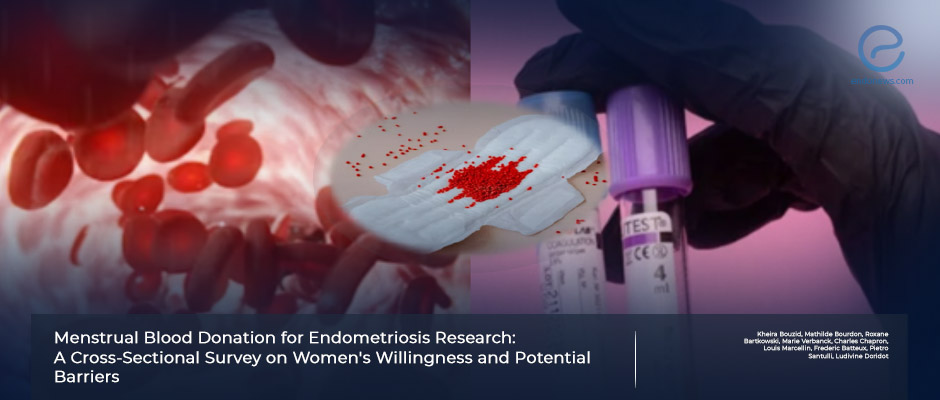Women's willingness to donate menstrual blood for endometriosis research
Apr 26, 2024
Menstrual blood is an easily accesible body fluid without an invasive procedure.
Key Points
Importance
- Menstrual blood is a readily accessible biological fluid available monthly in non-pregnant women of reproductive age.
Highlights
- Women with self-declared endometriosis were more likely to donate their menstrual blood for endometriosis research compared to self-declared unaffected women.
What's done here
- An anonymous online survey in French was distributed via social media in September 2022 to understand the willingness of women to donate their menstrual fluid and to assess their potential barriers.
Key Results
- Total number of women who answered the survey was 778.
- The percentage of women who had a diagnosis of endometriosis who were willing to donate their menstrual fluid was higher compared to unaffected women (83% to 68%).
- The previous use of menstrual cups for donation and the presence of dysmenorrhea symptoms are significantly associated with the donation desire.
- No significant relationship was obtained between the desire for donation and heavy menstrual bleeding, age, or subtypes or stages of endometriosis.
Lay Summary
The menstrual blood is 50-100 ml/per cycle, with 80% lost during the first three days. On the heaviest bleeding day, 2 to 8 ml may be collected from a cup worn for four hours. This fluid could be investigated by collecting viable immune and endometrial cells. The menstrual immune cells are similar to the circular immune cells in peripheral blood, with fewer T lymphocytes and more natural killer cells.
The delay in diagnosing endometriosis is estimated to be 8 years. The reason that endometriosis affects the quality of life and fertility and can cause pregnancy complications is that early diagnosis and prevention to progress the disease are important. Collecting and testing the menstrual blood may help diagnose the disease. However, willingness to donate the menstrual blood could be difficult due to its intimate nature and the taboo around it.
A scientific team from Université Paris Cité, Institut Cochin, Inserm, France, led by Dr.Doridot, aimed to evaluate women's willingness to donate their menstrual blood in a short anonymous online survey. They used social media to collect the answers to a simple questionnaire about menstruation and endometriosis. The survey link was active from September 2022 to February 2023.
Ten questions of the online survey with defined choices were about age, medical history of hormonal contraception, endometriosis diagnosis, type of endometriosis, menstrual experience including menstrual blood abundance, dysmenorrhea; and whether they would donate menstrual blood. Women with self-declared and established endometriosis diagnoses were compared to women with no endometriosis. The willingness to donate menstrual blood was higher in women who declared having an established endometriosis diagnosis (83%) compared to self-declared unaffected women (68%). The most important finding was that previous use of menstrual cups has a predictive value for donation willingness. The patients with the diagnosis of endometriosis and dysmenorrhea seemed eager to donate their menstrual blood.
The conclusion of this interesting study which was recently published in Reproductive Sciences was "Women affected or not by endometriosis are largely willing to donate their menstrual blood for endometriosis research, the presence of dysmenorrhea is not a barrier for donation, and women who use a menstrual cup are the more likely to donate".
Research Source: https://pubmed.ncbi.nlm.nih.gov/38418666/
online survey donation desire dysmenorrhea heavy menstrual bleeding menstrual cup hormonal contraceptions endometriosis.

